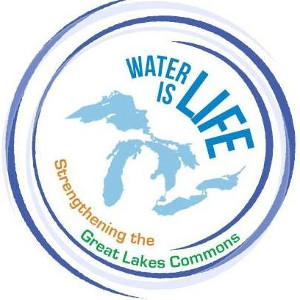
Editor’s note: The following are excerpts from an article about the recent Great Lakes Commons“Water if Life” conference in Flint, MI, by Emma Lui, campaigner for the Council of Canadians.
FLINT, MI – “My grandson, who is 12 years old, was to be an academic ambassador to go to Washington in 2014 and 2015. Well, he was an A-B student but by the time the lead began to corrode his brain, he was a D-E-F student,” said Bishop Bernadel Jefferson. A pastor for 27 years, she was one of the first signers of the emergency manager lawsuit against Michigan governor Rick Snyder in 2013. She said, “Tonight we make history. We did something they didn’t want us to do and that was to come together.”
Maude Barlow, world-renowned water activist, author and chairwoman of Council of Canadians, gave an important keynote speech on water justice struggles around the world and her work with other water warriors to have the United Nations recognize the human right to water and sanitation.
Jim Olson from FLOW gave an impassioned talk about Nestlé in Michigan and the importance of the public trust
Indigenous lawyer Holly Bird talked about the need for governments to honor the relationships that Indigenous people have with the water and how that can be done without someone controlling or owning water.
Lila Cabbil from the Detroit People’s Water Board talked about how the water fights are racialized in Michigan.
Sylvia Plain from Aamjiwnaang First Nation in Sarnia, Ontario talked about how they have had methylmercury in the sediments in their river for a couple of decades and how the Anishinaabe have cared for the waters and land for thousands of years.
Speaker Claire McClinton from Flint Democracy Defense League described the water crisis in Flint. She pointed out, “In Flint Michigan, you can buy a gallon of lead-free gas, or a gallon of lead-free paint, but you can’t get a gallon of lead-free water from your own tap.”
Marian Kramer of Highland Park Human Rights Coalition and Michigan Welfare Rights Organization spoke about fighting the shutoffs in Highland Park, a city within Metro Detroit where at one point half of the homes had their water shut off.
Peggy Case explained, “The right to water is being challenged everywhere. The privatization of water is a key piece of what’s going on in Flint.”
In Evart, Michigan, Nestlé pumps more than 130 million gallons (492 million liters) of water a year to bottle and sell to consumers. Nestlé pumps up to 1.2 million gallons (4.7 million liters) a day in southern Ontario despite the fact that both of its permits have expired.
Participants at the conference were outraged that governments allow Nestlé and other water companies to take, control and sell water for a profit while failing to secure clean water for residents in Flint, Detroit, and many Indigenous nations. They pledged to boycott Nestlé and single-use bottles of water and to take action to end Nestlé’s bottled water takings in the Great Lakes; to work to have the human right to water implemented and to bring water justice to all who live around the lakes.
Visit rabble.ca for the full article.
Great Lakes groups band together to challenge Nestlé and the water crises
Latest
The People’s Tribune opens its pages to voices of the movement for change. Our articles are written by individuals or organizations, along with our own reporting. Bylined articles reflect the views of the authors. Articles entitled “From the Editors” reflect the views of the editorial board. Please credit the source when sharing: peoplestribune.org. Please donate to help us keep bringing you voices of the movement for change. Click here. We’re all volunteer, no paid staff. The People’s Tribune is a 501C4 organization.


There used to be a law re: water rights in the US that made it illegal to sell water. An agency can only sell delivery of water. How does Nestle get around that? Or has that law been written off.